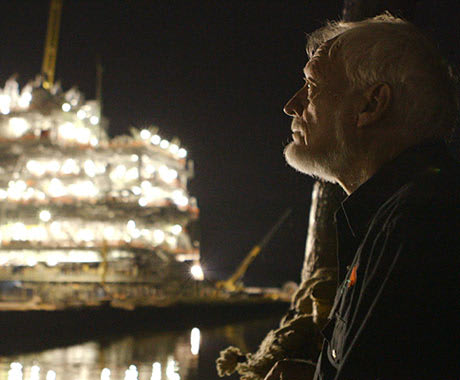The tendency in our culture these days is to get riled up following a huge catastrophe, only to forget about it as soon as the next big news story comes along. For instance, when the Deepwater Horizon oil rig exploded in 2010 in the Gulf of Mexico and led to the worst oil spill in American history, people were suitably outraged for a while, but a dependence on oil eventually won out and business carried on as usual. Margaret Brown's The Great Invisible is a thorough dissection of the events leading up to the disaster, the areas and people affected by it and what has been done to ensure that greed does not outweigh safety again (spoiler: not very much).
We meet those who were onboard the rig when it happened and now suffer from post-traumatic stress after managing to barely escape with their lives, along with a father who lost his son that day. There's also attention paid to the fishermen and workers within the industry that now have little money coming in because of the spill's impact. One of the emerging central figures is Rosie, a kindly old volunteer in Bayou La Batre who makes sure those in need are fed even when the cupboards are nearly bare.
The film also makes sure to present the even more disheartening bureaucratic side of things, in which the plan to make it easier for the appropriate people to be compensated is somehow just as fraught with caveats and ineligibilities. The cameras may leer a little too long at a dinner at which rich men from oil companies smoke cigars and generally act smug, but then these people do evidently lack the self-awareness to know how easy they are making it for themselves to be vilified.
It would all be almost too depressing to bear if it wasn't for the compassionate presence of Rosie, diligently making his rounds and cooking meals for hundreds when necessary. He has the kind of hard-earned wisdom those wealthy tycoons will never be able to buy.
(Participant Media)We meet those who were onboard the rig when it happened and now suffer from post-traumatic stress after managing to barely escape with their lives, along with a father who lost his son that day. There's also attention paid to the fishermen and workers within the industry that now have little money coming in because of the spill's impact. One of the emerging central figures is Rosie, a kindly old volunteer in Bayou La Batre who makes sure those in need are fed even when the cupboards are nearly bare.
The film also makes sure to present the even more disheartening bureaucratic side of things, in which the plan to make it easier for the appropriate people to be compensated is somehow just as fraught with caveats and ineligibilities. The cameras may leer a little too long at a dinner at which rich men from oil companies smoke cigars and generally act smug, but then these people do evidently lack the self-awareness to know how easy they are making it for themselves to be vilified.
It would all be almost too depressing to bear if it wasn't for the compassionate presence of Rosie, diligently making his rounds and cooking meals for hundreds when necessary. He has the kind of hard-earned wisdom those wealthy tycoons will never be able to buy.




